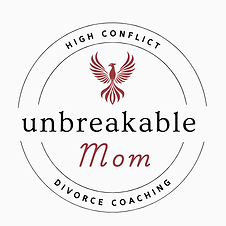
Helpful Resources for Navigating
High-Conflict Divorce
Here, I've gathered resources that I’ve found to be invaluable for those navigating the challenges of a high-conflict divorce. These materials cover a range of topics, including understanding narcissistic behavior, strategies for keeping children safe, and ways to educate them to protect their mental and emotional well-being. You’ll also find information on co-parenting, managing stress, legal resources, and tips for maintaining your own mental health throughout this difficult process. These resources are designed to empower you with the knowledge, tools, and support you need to move forward confidently and protect yourself and your children.

Aimee Says
Aimee Says is a communication tool designed to help individuals navigate high-conflict situations with clarity and emotional control. It focuses on using simple, direct language to set boundaries, express needs, and maintain composure when dealing with difficult personalities. In high-conflict divorce cases, Aimee Says can be a powerful resource to reduce misunderstandings, avoid escalation, and ensure your messages are clear and non-reactive—especially in co-parenting situations or communication with a high-conflict ex.
Understanding Narcissism and Antagonistic Personalities
Narcissism and antagonistic personalities are characterized by self-centeredness, a lack of empathy, and a constant need for admiration or control. People with these traits often manipulate others, create conflict, and struggle to maintain healthy relationships. In high-conflict divorces, these personalities can be especially challenging, as they may use tactics like gaslighting, emotional abuse, and constant power struggles to maintain control. Understanding these behaviors is crucial for setting boundaries and protecting yourself and your children.
Key Traits of Narcissistic Co-Parents
Post-Seperation Abuse
Post-Separation Abuse refers to any abusive behavior that continues or escalates after a couple has separated. This can include emotional, financial, psychological, or even physical abuse that takes place after the relationship ends. Often, the abuser uses tactics such as harassment, manipulation, or controlling behaviors to maintain power and control over the other person, especially if children or shared assets are involved. Post-separation abuse can be especially damaging, as it often continues through co-parenting situations or legal proceedings. It’s important to recognize these patterns and seek support to break free from the cycle of abuse.

Graphic provided by One Mom's Battle
Essential Strategies for Co-Parenting with a Narcissist
-
Setting Firm Boundaries: Narcissists often push boundaries or disregard them entirely. Learning how to set clear, non-negotiable boundaries, and sticking to them, is essential. This helps protect your emotional well-being, your children, and your co-parenting relationship.
-
Emotional Detachment: Narcissists thrive on emotional reactions. Learning to detach emotionally from their provocations can prevent them from manipulating or controlling your responses.
-
Co-parenting Communication: Narcissists often engage in high-conflict communication. Educating yourself on how to communicate effectively (and minimally) with a narcissist—preferably in writing and keeping conversations focused solely on the children—can help you avoid unnecessary conflict.
-
Prioritizing Your Children’s Well-being: It's crucial to understand how a narcissistic co-parent can impact your children, both emotionally and psychologically. Equipping yourself with strategies for safeguarding their mental and emotional health while navigating this difficult dynamic is critical.







Nurturing Your Child’s Well-being
As co-parents in a high-conflict divorce, our primary goal is to create a stable and supportive environment for our children. We strive to ensure healthy interactions that promote their emotional well-being and support their growth and development, despite the challenges we may face. By focusing on the best interests of our children, we can help them thrive during and after the divorce process.
How to Help Your Child:
Teaching our children to understand themselves and their emotions is crucial, especially when navigating relationships with narcissistic individuals. By developing emotional awareness, children can better recognize manipulative behaviors and protect themselves from emotional harm. Understanding their feelings helps them build resilience, set healthy boundaries, and develop the confidence to express their needs. In the face of narcissism, this self-awareness becomes a powerful tool for safeguarding their emotional well-being and promoting a positive sense of self.

Encourage Open Communication:
Create a safe space for your child to express their feelings without fear of judgment or retaliation.
Model Healthy Boundaries:
Show your child how to set and maintain healthy boundaries with others, including narcissistic individuals.
Validate Their Emotions:
Acknowledge your child’s feelings, letting them know it’s okay to feel upset, confused, or angry.
Promote Self-Worth:
Reinforce their value and remind them that they deserve respect, love, and kindness.
Teach Emotional Awareness:
Help your child identify and label their emotions to build a better understanding of what they’re experiencing.
Provide Consistent Support:
Be a constant source of support, reassurance, and stability as they navigate difficult relationships.

Books to Help Children Understand Their Emotions
Have You Filled a Bucket Today? by Carol McCloud
Buckets, Dippers, and Lids: Secrets to Your Happiness by Carol McCloud
The Rabbit Listened by Cori Doerrfeld
Listening to My Body by Gabi Garcia
Sometimes I am Hot Lava by Jody Jensen Shaffer
Let's Talk About Body Boundaries, Consent and Respect by Jayneen Sanders & Sarah Jennings
Parenting Safe Children Workshop
Keeping Children Safe from Sexual Abuse
Parenting Safe Children’s workshops provide essential education on protecting your children from sexual abuse, including how to spot warning signs, empower your children, and create a prevention team. Learn practical tools to safeguard your children from harm in everyday environments.


Mindful
Parenting
- The Antidote to Narcissism -
Mindful parenting encourages parents to stay present, calm, and attentive in the moment, rather than reacting impulsively. By modeling self-regulation and emotional awareness, mindful parents help their children develop their own coping skills and emotional intelligence, which is essential when dealing with narcissistic behaviors.
Books for Protective Moms
"Divorcing a Narcissist: One Mom’s Battle" by Tina Swithin
-
This book provides a firsthand account of navigating the legal and emotional challenges of divorcing a narcissistic partner, particularly when children are involved. Swithin offers both personal insight and practical guidance, helping readers recognize manipulative tactics and protect themselves and their children during high-conflict custody battles. It's an empowering resource for parents seeking validation and strategies to survive the family court system.
"It's Not You: Identifying and Healing from Narcissistic People" by Dr. Ramani Durvasula
-
This book serves as a compassionate guide for individuals entangled in relationships with narcissistic individuals. Dr. Durvasula, a clinical psychologist with extensive experience in narcissistic dynamics, offers insights into recognizing manipulative behaviors such as gaslighting and blame-shifting. She provides practical strategies for setting boundaries, fostering self-compassion, and healing from the emotional toll of such relationships. This resource is particularly valuable for those navigating high-conflict family situations, including custody disputes, where understanding and addressing narcissistic abuse is crucial.
"Framed: Women in the Family Court Underworld" by Dr. Christine M. Cocchiola and Amy Polacko
-
This book exposes how coercive control and systemic gender bias in family courts often leave protective mothers vulnerable to losing custody of their children to abusive ex-partners. Through 22 real-life stories from women across the globe, the authors—both survivors and advocates—highlight how abusers manipulate legal systems to continue their control. It's a vital resource for those navigating high-conflict custody battles and for professionals seeking to understand the intersection of domestic abuse and family law.
"Protecting the Gift: Keeping Children and Teenagers Safe (and Parents Sane)" by Gavin de Becker
-
This book offers expert advice on how to keep children safe in potentially dangerous or uncertain situations, including understanding red flags in relationships and environments.
"The Power of Showing Up: How Parental Presence Shapes Who Our Kids Become and How Their Brains Get Wired" by Daniel J. Siegel and Tina Payne Bryson
-
This book emphasizes the importance of showing up emotionally for your children, which is crucial in high-conflict family situations. Siegel and Bryson argue that consistent, attuned parenting creates a foundation of trust and security. This book is especially valuable for single parents or those going through divorce, as it provides strategies for being emotionally available despite external stress.

Empowerment Through Knowledge and Support
Navigating a high-conflict divorce or co-parenting with a narcissistic partner can feel isolating, but you don't have to go through it alone. These resources are carefully selected to provide you with the tools, knowledge, and emotional support you need to protect yourself and your children. Whether it's books for both you and your children, workshops for safer parenting, or expert advice on understanding narcissism, these resources are here to guide you toward a healthier, safer path forward. You deserve clarity, peace of mind, and a brighter future – and it starts with informed, empowered choices.
.png)








